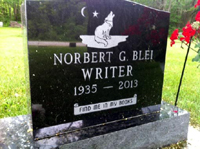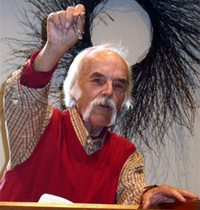
NOTES from the UNDERGROUND No. 156 | October 9, 2008
PETER MATTHIESSEN
(NPR Oct. 8, 2008)
First:
If you have never read him, don’t leave the planet till you do.
Second:
If you’ve never read him; if it’s been a long time since you read him; if you’re surprised he’s still alive (83); if you have children and grandchildren and you feel it’s important that they be left with all the wonders of the natural world; if you think politics and nature are essential to man’s survival; if you think whoever is awarded the Nobel Prize for Literature this week, it won’t be Peter Matthiessen (but should be); if you have any interest whatsoever in the role of Zen in a man’s life and art; if you feel there is no one left to be trusted, given the culture, the politics of spokespeople and leadership in the world; if you would like to “meet” Matthiessen, the mind and soul of the man, “listen up” to one of the best interviews you will ever experience on NPR, the program “On Point” hosted, just yesterday, by Tom Ashbrook.
Here’s the link. Just click …
Make
a pot of green tea. Have a beer. A snifter or brandy, a glass of Scotch (neat). Tune in….
The
world needs to listen “Zen Master” Matthiessen, while there’s still time. Norbert Blei
![]()
 Peter Matthiessen (born May 22, 1927, in New York City) is an American novelist and nonfiction writer and an environmental activist. Matthiessen’s work is known for its meticulous approach to research. He frequently focuses on American Indian issues and history, as in his detailed study of the Leonard Peltier case, In the Spirit of Crazy Horse.
Peter Matthiessen (born May 22, 1927, in New York City) is an American novelist and nonfiction writer and an environmental activist. Matthiessen’s work is known for its meticulous approach to research. He frequently focuses on American Indian issues and history, as in his detailed study of the Leonard Peltier case, In the Spirit of Crazy Horse.
Along with George Plimpton, Harold L. Humes, Thomas Guinzburg and Donald Hall, Matthiessen founded the literary magazine The Paris Review in 1953. At the time he was a young recruit for the CIA.
In 1965, Matthiessen wrote a novel about a group of American missionaries and a South American tribe. The book was later made into a major Hollywood film with the same title, At Play in the Fields of the Lord, in 1991. In 1979, Matthiessen’s nonfiction book The Snow Leopard won the Contemporary Thought category of the National Book Award. His work on oceanographic research, “Blue Meridian,” with photographer Peter A. Lake, documented the making of the film “Blue Water, White Death,” which was directed by Peter Gimbel and Jim Lipscomb. This is widely considered to have inspired Peter Benchley to write Jaws in 1974. Matthiessen has been the official State Author of New York, 1995-1997.
More recently, Matthiessen’s fiction trilogy Killing Mr. Watson, Lost Man’s River and Bone by Bone was based on accounts of Florida planter Edgar J. Watson’s death shortly after the Southwest Florida Hurricane of 1910.
Shortly after the 1983 publication of In The Spirit of Crazy Horse, Matthiessen and his publisher Viking Penguin were sued for libel by FBI agent David Price and former South Dakota governor William J. Janklow. The plaintiffs sought over $49 million in damages; Janklow also successfully sued to have all copies of the book withdrawn from bookstores. After four years of litigation, Federal District Court Judge Diana E. Murphy dismissed Price’s lawsuit, upholding Matthiessen’s right “to publish an entirely one-sided view of people and events.” In the Janklow case, a South Dakota court also ruled for Matthiessen. Both cases were appealed. In 1990, the Supreme Court refused to hear Price’s arguments, effectively ending his appeal; the South Dakota Supreme Court dismissed Janklow’s case the same year. With the lawsuits settled, the paperback edition of the book was finally published in 1992.
In his book The Snow Leopard, Matthiessen reports having a somewhat tempestuous on-again off-again relationship with his wife Deborah, culminating in a deep commitment to each other made shortly before she was diagnosed with cancer. She died in New York City near the end of 1972. She and Matthiessen had four children; the youngest of them, Alex Matthiessen, was 7 or 8 years old at the time of her death. In September of the following year, Matthiessen went on an expedition to the Himalayas with field biologist George Schaller.
Matthiessen and Deborah practiced Zen Buddhism. Matthiessen later became a Buddhist priest of the White Plum Asanga. He lives in Sagaponack, New York.
Bibliography
Fiction
- * Race Rock (1954)
- * Partisans (1955)
- * Raditzer (1961)
- * At Play in the Fields of the Lord (1965)
- * Far Tortuga (1975)
- * On the River Styx and Other Stories (1989)
- * Killing Mister Watson (1990)
- * Lost Man’s River (1997)
- * Bone by Bone (1999)
- * Shadow Country (2008) (a new rendering of the Watson trilogy)
Nonfiction
- * Wildlife in America (1959)
- * The Cloud Forest: A Chronicle of the South American Wilderness (1961)
- * Under the Mountain Wall: A Chronicle of Two Seasons in the Stone Age (1962)
- * “The Atlantic Coast”, a chapter in The American Heritage Book of Natural Wonders (1963)
- * The Shorebirds of North America (1967)
- * Oomingmak (1967)
- * Sal Si Puedes: Cesar Chavez and the New American Revolution (1969)
- * Blue Meridian. The Search for the Great White Shark (1971).
- * The Tree Where Man Was Born (1972)
- * The Snow Leopard (1978)
- * Sand Rivers (1981)
- * In the Spirit of Crazy Horse (1983) ISBN 0-14-014456-0
- * Indian Country (1984)
- * Nine-headed Dragon River: Zen Journals 1969-1982 (1986)
- * Men’s Lives: The Surfmen and Bayen of the South Fork (1986)
- * African Silences(1991)
- * Baikal: Sacred Sea of Siberia (1992)
- * East of Lo Monthang: In the Land of the Mustang (1995)
- * The Peter Matthiessen Reader: Nonfiction, 1959-1961 (2000)
- * Tigers in the Snow (2000)
- * The Birds of Heaven: Travels With Cranes (2001)
- * End of the Earth: Voyage to Antarctica (2003)
![]()
 Peter Matthiessen (né le 22 mai 1927 à New York) est un naturaliste et écrivain américain, auteur d’œuvres de non-fiction et de fiction.
Peter Matthiessen (né le 22 mai 1927 à New York) est un naturaliste et écrivain américain, auteur d’œuvres de non-fiction et de fiction.
Les œuvres de Matthiessen sont connues pour être extrêmement bien documentées. Il s’est souvent focalisé sur les problèmes touchant les Indiens d’Amérique et leur histoire, comme par exemple dans son étude détaillée du cas de Leonard Peltier, In the Spirit of the Crazy Horse.
Avec George Plimpton, Harold Humes, Thomas Guinzburg et Donald Hall, il fonda en 1953 le magazine littéraire The Paris Review. À l’époque, c’était une jeune recrue de la CIA, et il utilisa le magazine pour se couvrir.
Dans son livre Le léopard des neiges, Matthiessen parle de sa relation tumultueuse avec sa femme Deborah et de leurs séparations récurrentes, relation qui culmina dans un profond engagement de l’un vers l’autre, après qu’elle a été diagnostiqué d’un cancer. Elle mourut à New-York vers la fin de 1972. Ils eurent 4 enfants, le plus jeune, Alex, ayant 7 ou 8 ans au moment de la mort de sa mère. L’année suivante, en septembre, Matthiessen participa à une expédition en Himalaya avec le biologiste George Schaller, expédition qu’il narra dans le livre Le léopard des neiges.
En 1979, ce livre reçut le prix National Book Award dans la catégorie “Pensée contemporaine”. Son roman En liberté dans les champs du Seigneur, narrant l’histoire d’un missionnaire américain dans une tribu sud-américaine, servit en 1991 de base au scénario d’un film hollywoodien réalisé par Hector Babenco. Blue Meridian, son livre sur la recherche océanographique, présente le tournage du film de Peter Gimbel et de Jim Lipscomb, Blue Water, White Death, qui est généralement considéré comme étant la source d’inspiration de Peter Benchley lorsqu’il écrivit son roman Les dents de la mer en 1974. Matthiessen a été l’auteur officiel de l’État de New York de 1995 à 1997.
Plus récemment, la trilogie de Matthiessen Killing Mr. Watson, Lost Man’s River et Bone by Bone a été basée sur les récits de la mort d’Edgar Watson, un planteur de Floride décédé peu de temps après l’ouragan qui déferla sur le Sud-Est de la Floride en 1910.
Peter Matthiessen et sa femme Deborah étaient des pratiquants du bouddhisme zen. Matthiessen devint plus tard moine bouddhiste. Il vit à Sagaponack, dans l’État de New York.
Bibliographie
Fiction
- * Race Rock (1954)
- * Partisans (1955)
- * Raditzer (1961)
- * At Play in the Fields of the Lord (1965)
- * Far Tortuga (1975)
- * On the River Styx and Other Stories (1989)
- * Killing Mister Watson (1990)
- * Lost Man’s River (1997)
- * Bone by Bone (1999)
Non-fiction
- * Wildlife in America (1959)
- * The Cloud Forest: A Chronicle of the South American Wilderness (1961)
- * Under the Mountain Wall: A Chronicle of Two Seasons in the Stone Age (1962)
- * “The Atlantic Coast”, a chapter in The American Heritage Book of Natural Wonders (1963)
- * The Shorebirds of North America (1967)
- * Oomingmak (1967)
- * Sal Si Puedes: Cesar Chavez and the New American Revolution (1969)
- * Blue Meridian. The Search for the Great White Shark (1971).
- * The Tree Where Man Was Born (1972)
- * The Snow Leopard (1978)
- * Sand Rivers (1981)
- * In the Spirit of Crazy Horse (1983)
- * Indian Country (1984)
- * Nine-headed Dragon River: Zen Journals 1969-1982 (1986)
- * Men’s Lives: The Surfmen and Bayen of the South Fork (1986)
- * African Silences(1991)
- * Baikal: Sacred Sea of Siberia (1992)
- * East of Lo Monthang: In the Land of the Mustang (1995)
- * The Peter Matthiessen Reader: Nonfiction, 1959-1961 (2000)
- * Tigers in the Snow (2000)
- * The Birds of Heaven: Travels With Cranes (2001)
- * End of the Earth: Voyage to Antarctica (2003)



























































Leave a comment